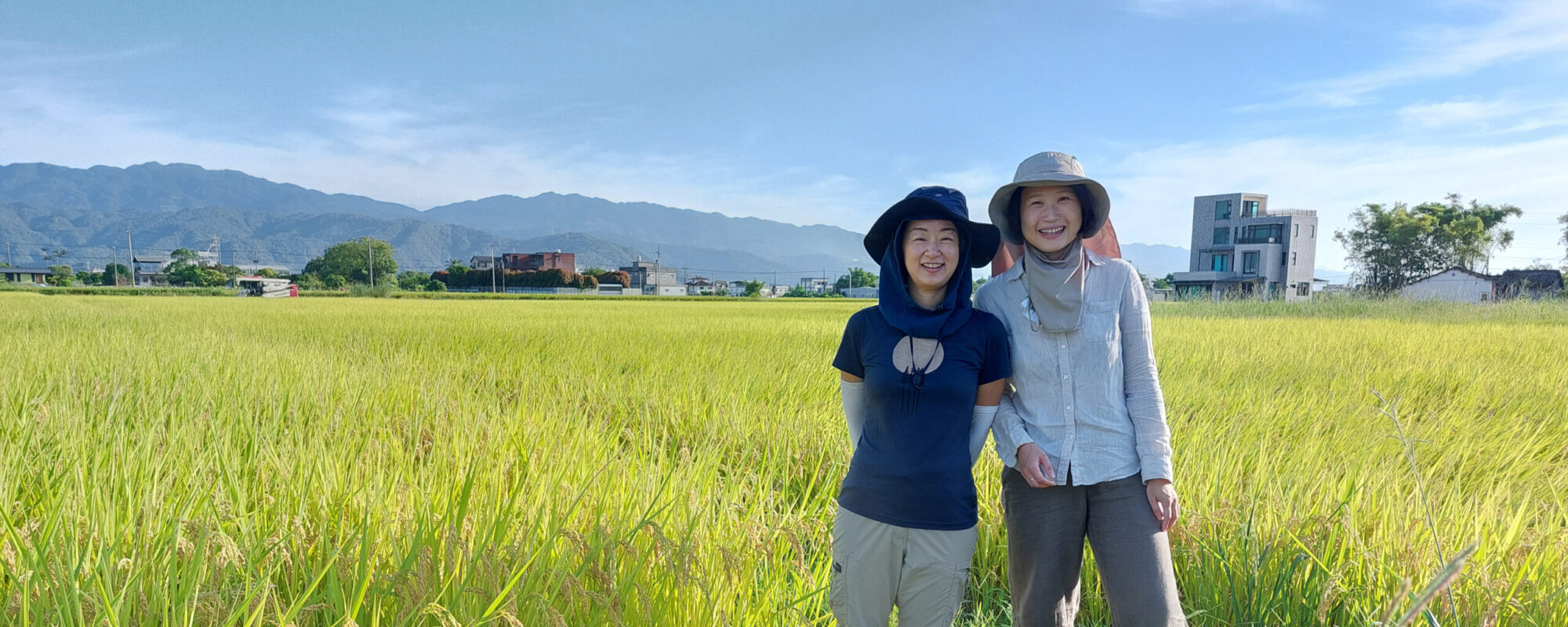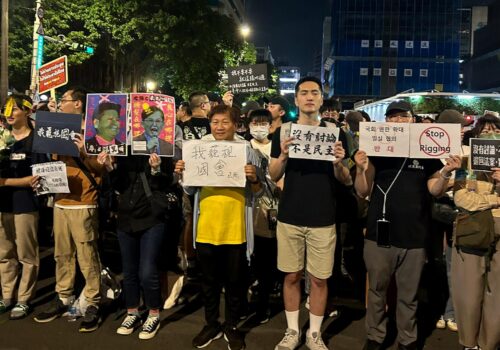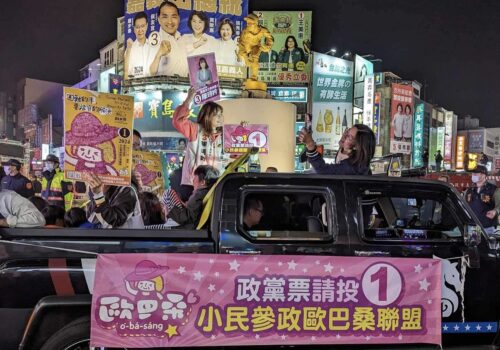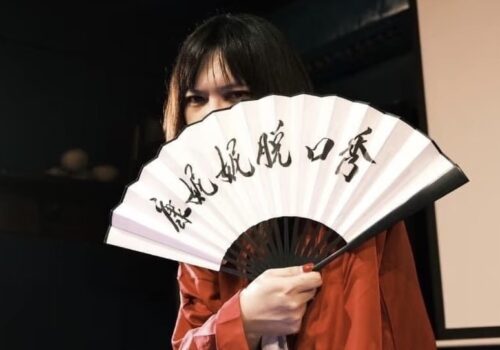YILAN, Taiwan — Before we begin the summer rice harvest around 6:30 a.m., the rice farmers Yen-ling and Kai-lun spread out a red-and-white-striped picnic blanket on a grassy overgrowth sandwiched between a golden rice field and concrete road. On the uneven ground, they lay out a spread of snacks and packaged goods—auspicious offerings to the spirits that wander these lands.
There is a whole pineapple, echoing the hue of the fields that stretch to forests and mountains to the west. Various boxes and sleeves of Taiwanese and international-brand biscuits, including a bag of Pepperidge Farm Veronas. A raw packet of Kinmen Handmade Misua, or thin noodles. Cured fish jerky. One of Kai-lun’s home-baked carrot-pineapple pound cakes, made with flour milled from last year’s rice. Three different types of yellow paper or joss money, each burned to send a different kind of offering to the “Lords of the Paddy” (tsan-tau-tsu in Taiwanese Hokkien): “Longevity Gold,” “Small Silver” and “Changing Clothes.”
“Do you want to pay your respects too?” Yen-ling asks, lighting a few sticks of incense in her hand with a lighter. “You can say them in English. The spirits will understand, as long as you speak from the heart.”
I take one of the incense sticks from Yen-ling, a thin trail of smoke still wafting from its tip, and the three of us turn to face the picnic blanket and rice paddies extending beyond. Under their wide-brimmed sunhats, the two women both have short bob haircuts that frame their round, jovial faces—freckles and small sunspots on their cheeks like badges of labor. They stand with their backs straight, shoulders pulled back, muscles subtly toned from farmwork and hiking. Yen-ling sports a navy-blue tee-shirt with a yellow full moon printed on its center, white sun-sleeves pulled up almost to her shoulders. Kai-lun wears a wrinkly linen white button-down and light khaki pants; miraculously, neither seems to have a single stain by the day’s end. The women close their eyes to begin their prayers, their faces backlit by the rising sun, heads bowed in peaceful elegance.
In Taiwan, paying respects to ancestral and spiritual figures is customary during major holidays and, for farmers, on occasions like the beginning and end of each planting season. Yen-ling explains that the Lord of the Paddy, alternatively referred to as “Big Brothers” (lau-tua-kong), are spirits with no descendants to worship them, untethered to an ancestral grave and instead left to wander into odd crevices or rice paddies. To take care of the rice paddies is to take care of these spirits, who are believed to have some power over the health of harvests and even people. “Over time, the village elders taught us the correct ways to pay respects to the Big Brothers,” she says. “Some landlords often check in to make sure their farmer tenants follow these customs.”
In turn, the two women start by saying their names, hometown and age. They update the spirits about their lives—how their cats and parents are doing, how this past planting and weeding season went—and even mention me, asking the spirits to look over me as I spend these two years far from my family. While the ritual’s purpose is to appease these spirits, the two women seem to be offering a life update to a long-distance friend.
When it’s my turn, I close my eyes. As the last whiffs of incense float toward me, a gentle breeze patting the sweat on my forehead, I thank the Big Brothers for welcoming me onto this land and giving the gender-inclusive and LGBTQ+ friendly Land Dyke Experimental Family Farm (tulake shiyan nongjiayuan, hereafter “Land Dyke”) space for the last 10 years. I ask if the spirits could continue to care for these women, and that as the swampy patches of rice paddies drain to reveal golden-hued blankets of rice husks each summer, the spirits will encourage them with good harvests year after year.
After we each pay our respects, we bow three times toward the fields and plant our incense sticks next to the picnic blanket, where they eventually fade into neighboring blades of dry grass. “The wandering spirits of early bachelor-settlers from southeast China are now being taken care of by modern LGBT-friendly farmers,” Yen-ling wrote in a 2019 academic reflection on her farming life. I chuckle the first time I read the line—how ironic that these likely patriarchal, machismo pioneers now must rely on the support of lesbian farmers.
As I accompanied Land Dyke members Yen-ling and Kai-lun on the day of their summer harvest, I soon learned that forging these unlikely and unexpected relations has been at the core of the collective’s activism. As a queer farm collective, their work has focused on redefining what it means to be a “family,” drawing upon and extending queer notions of chosen family. While their focus and structure have shifted over the last decade, they continue to plant a stake in the ground, and under the pressures of land speculation and development rampant across Yilan County, I found that worth celebrating.
As we packed up the picnic blanket and their contractor started the engine of his rice harvester, Yen-ling and Kai-lun gazed out onto their field one last time, admiring the uniform ripples with each light breeze and celebrating their success in calculating the optimal distance between seedlings this year.
“To me [this is a story] of co-survival, of human and nonhuman refugees helping each other out and turning industrial ruins into livable, inhabitable refugia,” Yen-ling continued to write.
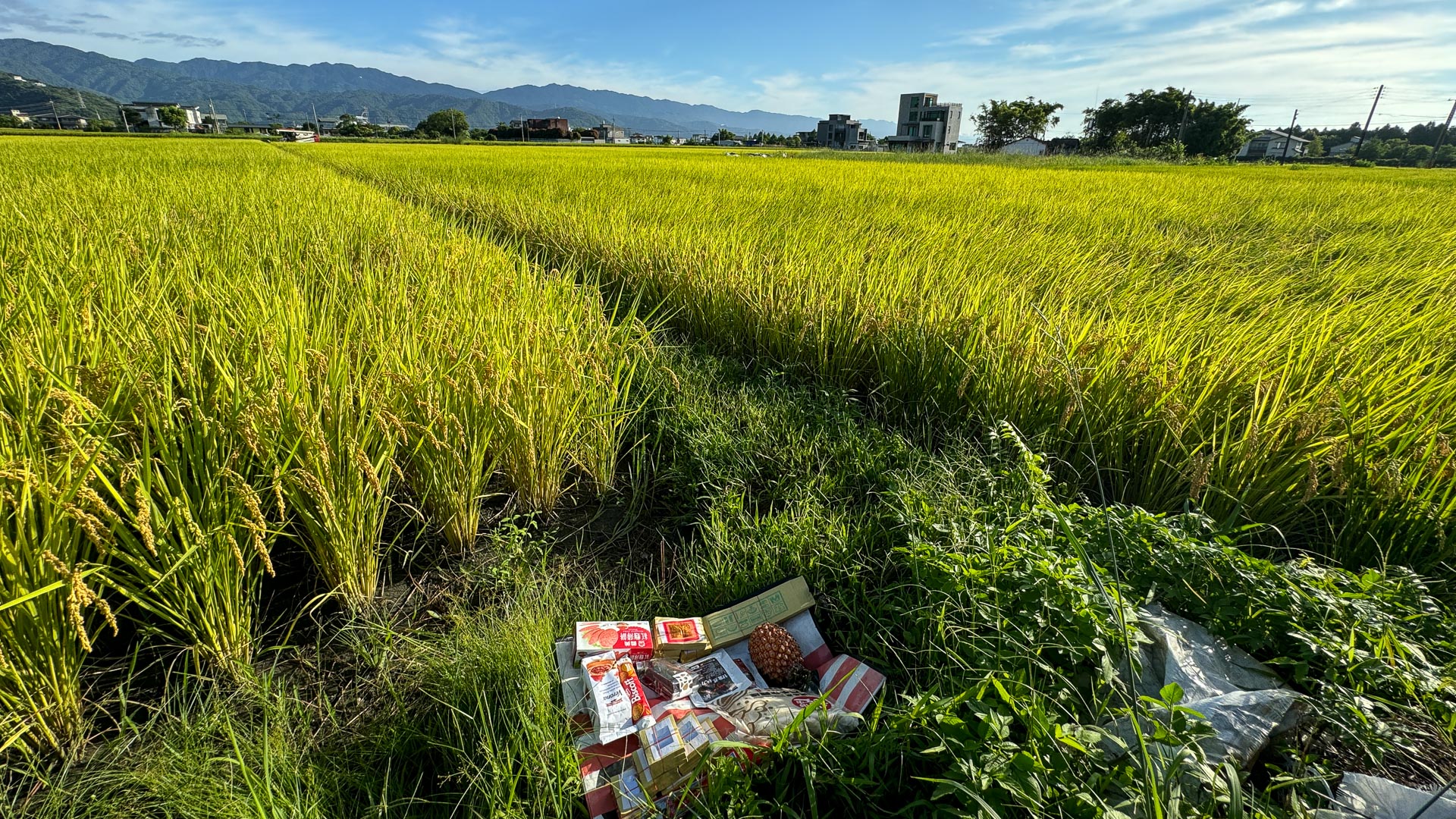
The name “Land Dyke” pays homage to the eponymous feminist and lesbian separatist movements that swept the United States and peaked in the 1970s. Several thousand women packed their bags and headed for the hills, establishing a rhizomatic network of rural feminist utopias where corn and tomatoes provided both sustenance and the foundation for their independence from industry, capitalism and men. Each community had its own organizing principles. Some were purchased with private land trusts; some were vegan; others leaned into the freedom of gardening naked or turning waste into fertilizer. But the central conceit remained the same: women cooperated to carve out a space where they could be free on their own terms.
“Everybody was good at carpentry or welding or car engines or building a structure or chopping wood or felling trees,” former landdyke Aggie Agapito said in the University of Oregon’s Eugene Lesbian Oral History Project. “There was nothing we couldn’t do.”
When Yen-ling and Kai-lun greeted me just after 6 a.m. the day of their summer harvest, armored with UV-resistant clothing and knee-high dirt-streaked rain boots, it seemed there was nothing these two Land Dyke members couldn’t do. The concrete was already gently steaming from the sun, which left few shadows in these mostly flat lands, yet the two women called out to me from down the street, waving all four arms in unison.
“We didn’t expect you to arrive so early,” Yen-ling called out to me, tilting up the conical straw hat layered over a navy-blue, wider-brimmed sun hat. After ushering me to sit under the shade of her car trunk, she and Kai-lun stuffed my hands with freshly steamed meat buns, boxes of soy milk and repeated reminders to stay hydrated. “It gets hotter each year, which is why we start earlier each year,” she said, pouring me a cup of ice-cold coffee.
A few steps away from us, a cluster of white herons began to gather around the rice harvester—a red-and-white-bodied Yanmar AW6120 tractor, with metal claws in front that gnaw at the rows of rice, metal chute in back that spits out the separated grass—which had come to a spluttering stop just before I arrived. “They know this machine will not only gather the rice but also all the insects and wildlife hiding beneath,” Kai-lun said giggling, doting on the herons’ childlike hops and strides around the machine. “To different kinds of life, the rice harvest represents food.”
As she refitted her beige sunhat, Kai-lun explained the day’s plan. While the machine will plow through the paddy and harvest most of the rice, the three of us will manually scythe and gather rice from the corners or edges where it can’t maneuver. Each time the harvester fills up, we will pack the rice into large burlap bags, to be fitted like heavy Tetris blocks in the contractor’s blue pickup truck. After unloading the bags at a nearby processing plant with help from a forklift, the women will return after the afternoon summer monsoon to fertilize and heal the land.
As I finished my breakfast, the two women rustled through their car trunks to gather their scythes, work gloves, sunglasses and other work materials. The contractor munched a bun in the driver’s seat of his rice harvester, door swung open, inspecting the paddy and mentally mapping out his pathway. No one else was in sight. Just us, a dog barking behind a neighbor’s fence and the morning cicadas chirping in the paddies that extended toward the mountainous horizon. For the first-time farmhand in me, Tshim-Kau Village’s morning peace was pristine—perhaps too much.
Founded in 2012, the Land Dyke collective was part of a small farmer movement that took off around the same year. On their first plot of farmland in Yihe Village on Taiwan’s northwestern coast, Land Dyke’s original members learned to carve out irrigation waterways and check on their rice paddies at all hours, wading through uneven paddies in pitch-dark night. They hosted weekend experiential courses for other women and queer people to learn about environmental protection, nutrition and eco-friendly farming methods.
With these activities, Yen-ling and her three original companions—Wu Shao-wen, Chen Yi-ru and Yang Shu-hua—did not aim to isolate themselves from Taiwanese society, as the American landdykes aspired to. Rather, farmland was a vehicle for activism, echoing the words of Nancy Groschwitz in her 1979 treatise “Practical Economics for a Women’s Community”: “We will soon be able to integrate the pieces of our lives and stop this schizophrenic existence of a straight job by day and radical political work at night,” she wrote.
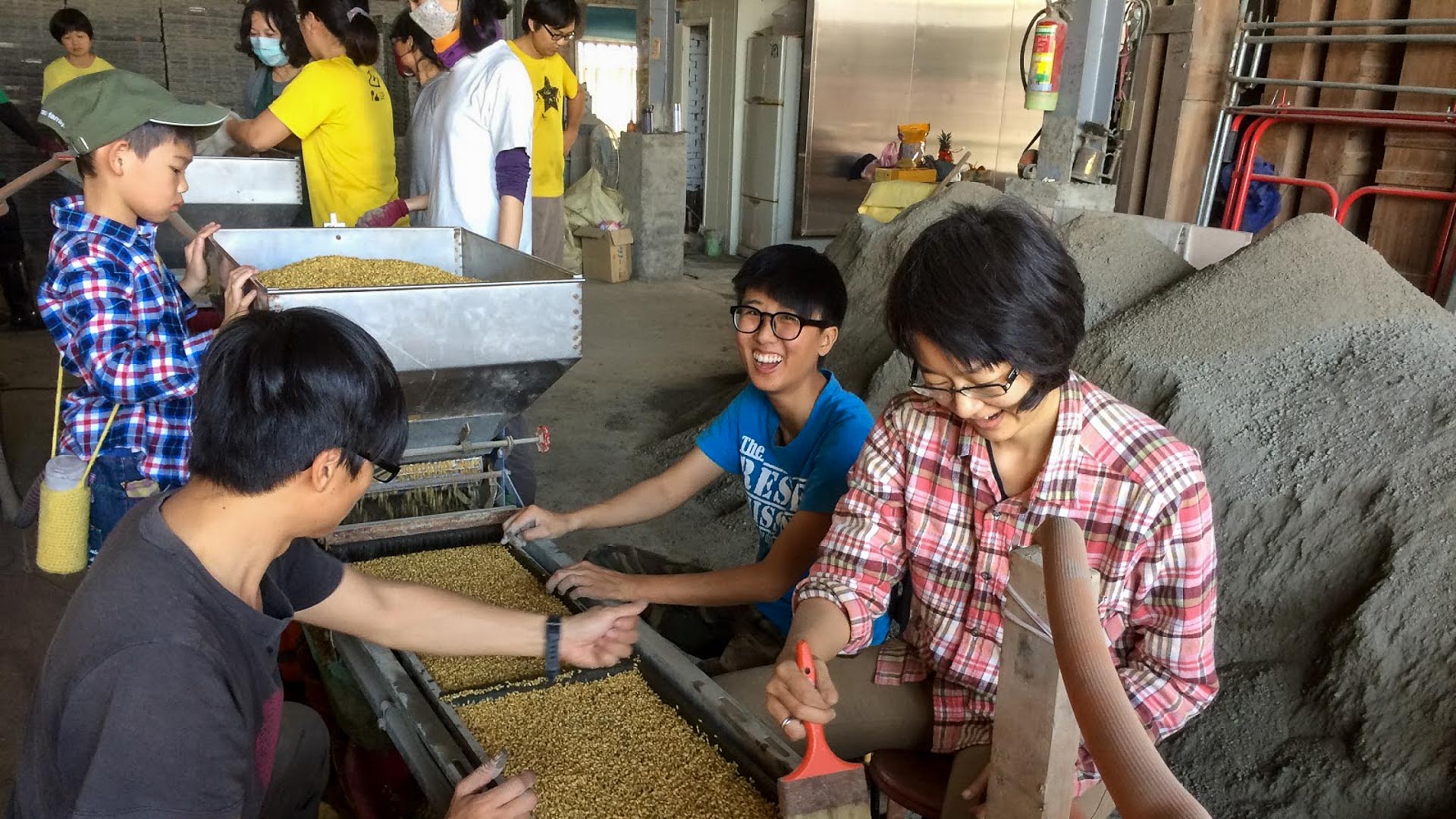
The Taiwanese Land Dyke members hoped to “bring gender concerns into the world of farming and ecological concerns into gender movements, and to do so with the simple strength of a farm tractor,” they explained in their blog.
LGBTQ+ and feminist movements in Taiwan have largely focused on the needs and crises of urban women, operating in activist hubs like Taipei and Kaohsiung. However, Land Dyke’s founding members knew firsthand that women’s agricultural labor was (and is) too often ignored. In 2015, approximately 20 percent of farm managers were women despite comprising just over half of the agricultural workforce, according to official census data. While that statistic has gradually climbed in the last 15 years, women’s unpaid domestic and farm labor are often made invisible as a wife’s or daughter’s filial duties. Women (let alone queer women) rarely inherit land, limiting their access to capital and power.
“In the early days, as four women on a farm, new neighbors or contractors would often ask to talk to our husbands or fathers or ask why we were not yet married,” Yen-ling said.
But for Land Dyke’s four founding queer women, marriage was not only legally impossible—at the time, same-sex marriage was banned—but also far from the point. They wanted to eradicate gendered notions of family and labor, earning women as much recognition for their work as men.
“When Shao-wen approached me to join Land Dyke, I was most attracted to the idea of building a multiple-person family in the countryside, something for which there was no script at that time or even now,” Yen-ling said. “Instead of pointing out the problem endlessly, we were actively developing an answer to how to live beyond the bounds of the heteronormative family and marriage.”
The women were inspired by the timely surge of advocacy around same-sex marriage and family equality in 2012. That year, the Taiwan Alliance to Promote Civil Partnership Rights (TAPCPR)—founded in 2009 as the first organization to focus on LGBTQ+ legal advocacy—proposed three civil amendments to expand legal definitions of “family.” Not only should marriage be a gender-neutral fundamental right available to everyone, they argued, but marriage need not be a prerequisite for consensual partnership or deep connection. Inspired by queer notions of chosen family, TAPCPR hoped to open the door for civil partnerships, households with more than two heads and other relational possibilities free from traditional gender roles. “The continuation of these relationships will not be at the sufferance of the court, but will rest instead upon the mutual willingness of all partners,” TAPCPR wrote in a public statement.
Although it was backed by Democratic Progressive Party (DPP) legislators Yu Mei-nu and Cheng Li-chiun, the low public uptake and swift emergence of anti-LGBTQ+ coalitions forced TAPCPR to prioritize marriage equality as its strategic advocacy area. While the strategy paid off, with same-sex marriage legalized in 2019, alternative notions of family have yet to return to mainstream public discourse.
Nevertheless, Land Dyke’s founders remained steadfast in their desire to prove—to the world and, to a certain extent, themselves—that a same-sex, multiple-person family is possible. After less than two years in Yi-he Village, where the members lived apart but collectively managed a rice paddy, they moved into a three-story home together in Yilan County on Taiwan’s northeastern coast, a rainbow and a Taiwanese independence flag lilting over the farming materials and shoe rack lined up outside their metal door. Two members became full-time farmers and the other two (including Yen-ling) part-time, as the collective rented a patchwork of rice paddies, vegetable and soybean fields and fruit orchards distributed across various townships.
Yen-ling waits for the rice harvester to approach, ready to drop a bundle of rice inside the machine
By day, Land Dyke members went about other jobs and participated in various local activism for causes such as small farmers’ rights to environmental protection or gender equity—all while tending their land. They railed against pesky water lilacs and barnyard grass that sprouted with full force in their rice paddies. In a photo essay about animals that passed through their rice paddy, they captioned one photo: “Little egret, please contact our control tower to ensure you do not land on our precious rice seedlings! Thank you!” In an ode to rice, they wrote directly to their rice grains during typhoon season: “You have worked vigorously to grow from seedlings into full flowers, and now occupy my heart’s most precious position.”
Each night, retreating into their communal home, the members would discuss the finances or next week’s division of farm labor. Once each week, the four women would do housework together, rotating responsibilities and discussing each decision with consensus. On their blog, they transparently publicized their early budgets and amount of land each member managed. “Every member brings their unique resources and networks,” Wu and Yen-ling wrote in a 2018 blog post. “Like a piece of soil, the order of arrival of its contents is not important; what matters is whether they can develop mutually supportive, coexisting relationships.”
Yen-ling described their home in those early days as a “sort of a rehabilitation center.” Members left no detail of their lives or interpersonal relationships to assumption; without the expectations of what a good “daughter” or “wife” must do, members discussed their commitments, responsibilities and desires, healing wounds from past relations and family environments.
In a past interview with the Taiwanese news platform News & Market, Yen-ling noted how she felt “stuck in past heterosexual relationships. I could understand a parent’s love, like when my ex-boyfriend’s parents passed on his favorite recipes to me, but I did not want to live with these kinds of thoughtlessly gendered divisions of labor.”
Their home also became a sanctuary for butch lesbian friends who lived in the city, their hearts bruised from homelessness induced by bad breakups or sudden unemployment. Butch lesbians were often typecast as anxious social rejects turned alcoholics. As former Land Dyke member Chen Yi-ru wrote in her 2019 essay collection Fermented Rainbows: Illuminating the Road Behind Me, “When I was young, I worried that my girlfriend would fall in love with a boy and leave me alone. As I’ve grown up, even as my identity has grown firmer, worries about the future persist because there are no examples of lesbian elders beside me. This is the silent, empty desolation that comes with being gay.”
For members and their friends, many of whom joined gender movements and activist organizations from desperation, the ability to imagine a future where they could live peacefully, wading through swampy rice paddies and sifting through invasive golden apple snails that nibbled on rice seedlings, became a form of therapy. Here, with dirt lodged in their fingernails and rice dust lingering like rashes on their skin, they found community among one another. Lesbian friends would stay for a few days, weeks, “however much time they needed to get back on their feet,” Yen-ling said. In the meantime, they could breathe some fresh air and help with some of the farmwork.
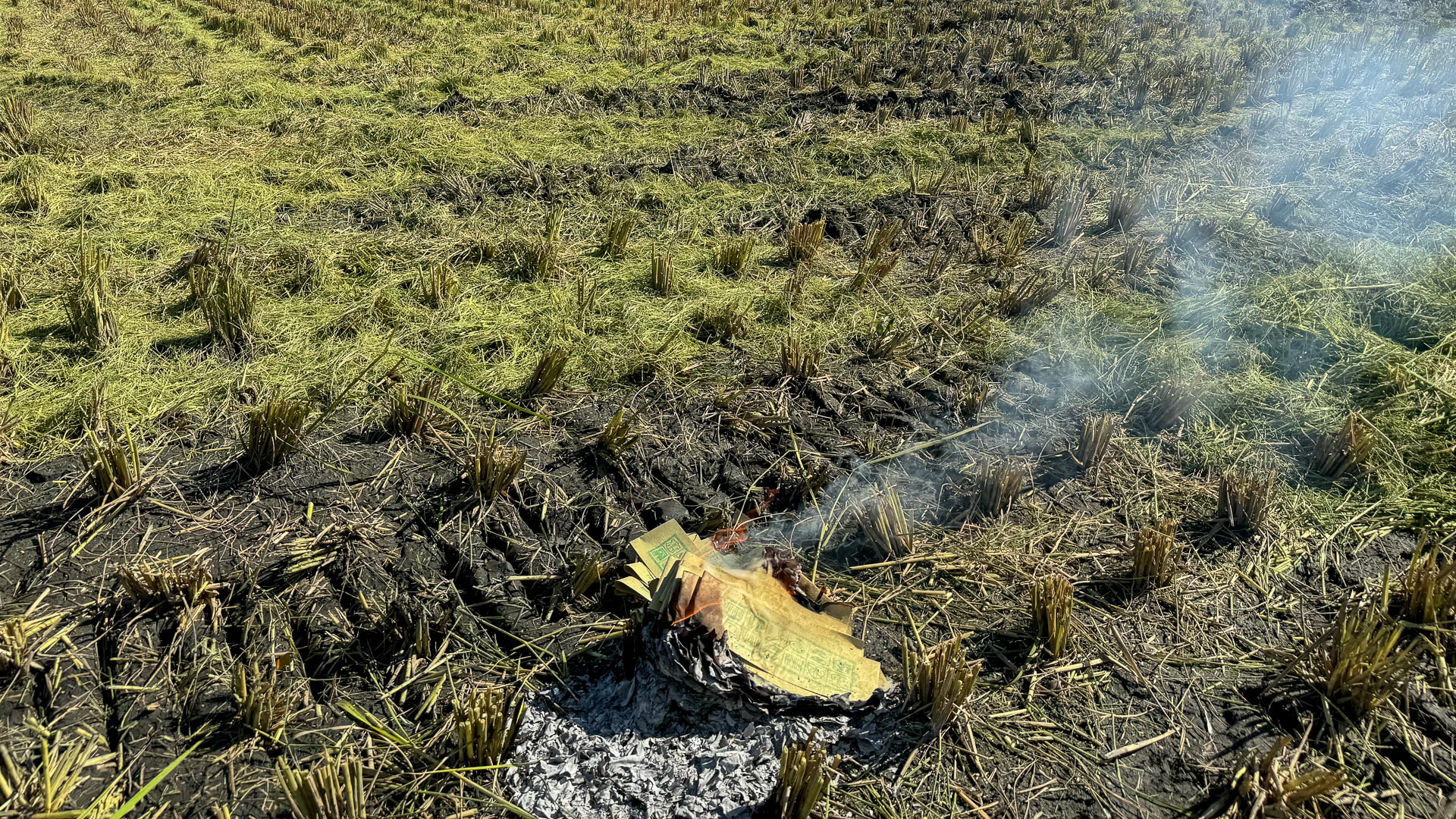
In one of the collective’s earliest blog posts, Wu wrote about her dream of a “rainbow ecological village,” where women and LGBTQ+ people could raise chickens, grow vegetables free of pesticides or other chemicals, operate a community bus that would connect the entire town and provide the education and support young LGBTQ+ people lack elsewhere in society. In time, with many of the other new farmers in Tshim-Kau Village, Land Dyke became increasingly embedded in a broader mutual aid network. They learned from other women in the village how to ferment their own plum wine, and from fellow farmers how to better prepare their paddies for the next harvest.
Within four years of operating their farm, the Land Dyke farmers were able to cover nearly all the commune’s costs with sales of varied crops and processed foods like rice biscuits and rice vinegar. Their sales network spread across Taiwan via social media and weekend farmers’ markets, attracting attention from gender-conscious and organic consumers. Media often came knocking at their doors through 2018, intrigued by the rare collective of lesbian organic farmers and increasing their visibility across Taiwan.
From the comfort of their rice paddies and vegetable fields, Land Dyke hoped to plant the seeds for the dreamed-of rainbow village, not only on their land but across Taiwan.
* * *
Yen-ling and I tread to a far corner to manually harvest a few dozen ears of rice. Scythe in hand, Yen-ling bends down at the waist, grabs each stalk of rice about two fists’ length from the ground and slices through it with one swift, clean motion. She piles the fallen stalks high, scanning the ground to ensure not a single grain of rice is overlooked. Every now and then, she takes off her work gloves and runs her hands through the bead-like husks: smooth, weightless strings of beige pearls, dangling from blades of grass dry enough to slice through skin.
As Yen-ling and I alternately squat and plod toward our respective piles of harvest, the harvester is beginning to make its way through the paddy, cutting through the golden blanket and leaving in its wake clean rows of track marks, discarded grass and small florets of rice stems. The white herons dutifully follow the harvester, some flying above and others pecking at the track marks.
“This is the first time in four years that we were able to fully plant our rice paddies,” Yen-ling said, treading through fields and conversations at a methodical Zen pace. She weaves between the rows of rice with calculated intent, as though carefully measuring out her energy expenditure in the summer sun. In conversation, her leisurely laughter and voice rarely vary in pace. She is captivating in her self-assurance.

For about two years, until Kai-lun joined the collective in 2022, Yen-ling managed these 0.8-hectares of rice alone, alongside her day job as a sociocultural anthropologist at National Yang Ming Chiao Tung University in Hsinchu—a three-hour commute from her home. (Earlier, she had also managed an independent bookstore in Yilan.) Yen-ling is the only original member of Land Dyke remaining in the collective; other members have come and gone.
“We definitely underestimated how difficult it would be to manage a farm in addition to a home,” she told me. In her past interviews and writing, hints of cracks in the home can be found: an overflow of dishes in the sink, cleaning sessions delayed, financial differentials between those with day jobs and those without. While Yen-ling had directed an eco-friendly farmers’ market and hired a farmhand to manage her parents’ small plot of land, she and other members were learning as they went—from tilling the land to managing production and sales. Farming was no longer a romantic pursuit but a constant battle with emotional and literal weeds that began to bloom across the land.
Land Dyke was not immune from the banalities of bureaucracy and interpersonal issues, particularly as consensus-based decision-making necessitated discussions about both important questions and petty arguments. When I asked Yen-ling what exactly had caused the rifts that led to the other members’ gradual departure, she responded matter-of-factly: just the accumulation of everyday minutiae and decisions that became wedges between members.
“We were focused on measuring fairness, calculating what we gave and what we got, but we didn’t even know if each other’s days were filled with happiness or not,” Chen wrote. “We opened our home to more and more guests while closing off our hearts to one another.”
Indeed, the weight of being (for the most part) first-time farmers and pioneering a multiple-person family caught up with them, and members began to leave the collective to pursue individual ambitions. Yang Shu-hua moved back to her hometown in Tainan to spend time with her elderly parents and establish her own organic farm. Chen moved north in Yilan County to Dongshan Township, where she set up a fermentation room, dabbles in pottery and continues to publish books on the intersection of feminism and agriculture. During Taiwan’s 2016 general elections, Wu unsuccessfully ran for a legislative seat in Yilan with the Green Party on promises to uplift the voices of women and small farmers, bringing new publicity as well as stressors to the collective. Once Wu and Yen-ling separated as partners and Wu left the collective to pursue a career rooted in politics and business, their lease on Land Dyke’s three-story base ended.
“We were so loud back then,” Yen-ling said, chuckling. “We might have promoted and talked about our brand of activism—putting these feminist, queer values into practice—more than we farmed.”
When I mention Land Dyke’s name in conversation, most gender activists are aware of them; after all, Yen-ling and Kai-lun frequently take part in events focused on gender and LGBTQ+ issues. Back in May, I first met Yen-ling and Kai-lun at a commemorative event in Taipei for the fifth anniversary of the legalization of same-sex marriage. A few young passersby stopped at the table to sample their rice biscuits, learning about the collective for the first time. However, outside such circles, I’m more often met with surprise that a lesbian-founded agricultural collective exists in Taiwan.
Among each other, former members are still cordial and repost one another’s life updates on their social media. Since 2020, however, Land Dyke’s new members have lived separately with their partners or cats or alone, gathering in the fields or promoting one another’s products under the collective’s rainbow logo and name. Members have continued to come and go, connected by a desire to farm and live a quiet, rural life. The collective is still comprised of women, but the mission of forming a multiple-person household that lives, eats and farms together is no longer as central. While it was straightforward to define Land Dyke as a lesbian collective as recently as four years ago, today some of its members are straight women and others are exploring trans-ness in the privacy of their relationships.
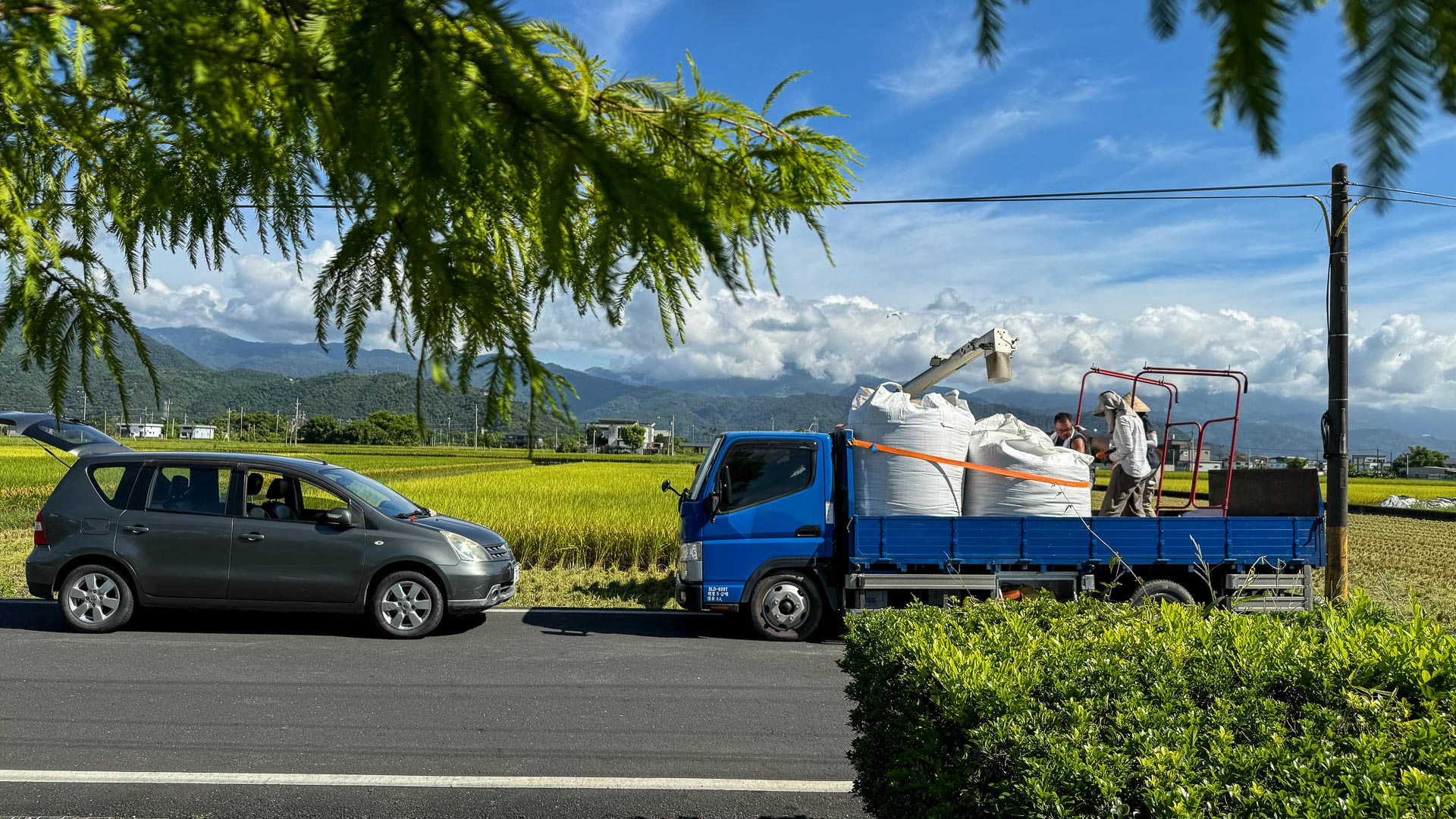
“We hope that Land Dyke will be the fertile soil upon which members can not only grow healthy crops but develop the foundation for fulfilling lives, with enough space to decide what those desires may include on their own terms,” the collective writes on its blog.
For Kai-lun, Land Dyke was an opportunity to take even greater control over the ingredients she uses for her baked goods: all-natural, pesticide- and preservative-free pound cakes made with seasonal flavors, such as carrot-pineapple, lavender-honey and pear-lemon. She was already acquainted with Yen-ling through a recreational hiking group and after volunteering on the farm throughout spring planting and weeding sessions, she joined the collective as a rice farmer in 2022, enabling Land Dyke to gradually return to its previous levels of production. “But now we have to figure out how to sell all of this rice,” Yen-ling and Kai-lun said almost in unison early in the day, followed by apprehensive but hopeful chuckles.
Throughout the morning, as we walked in single file over the stone-walled irrigation channels that divided the paddy into neat rectangles, Kai-lun explained planting details, from the various fertilization periods to the weeding process to the animals that frequent the space. As I rolled up my sleeves, she warned me that my skin might become itchy or irritated from dust from the rice harvester.
As I raked stray grass sprayed by the rice harvester, she and Yen-ling ushered me to shade because of concern I might get heat stroke.
Whenever their mute, elderly neighbor Aunt Ah-suan emerged from her walled-off home, a conical red-and-white burlap sunhat almost doubling her height, Kai-lun would always bend down to listen as intently as possible to what the old auntie was saying.
“I feel blessed to be in the company of such cute and dedicated partners as I learn to be a rice farmer,” Kai-lun said, referring not only to Land Dyke members but the natural and human community that encapsulates the collective.
As I followed Kai-lun and Yen-ling while they cut and piled grains of rice, seeking refuge in the shade between sips of ice-cold coffee, it seemed to me that for them, gender and sexuality were more a happy coincidence, not the features that defined them. “We’ve been in Tshim-Kau Village for 10 years now, and by planting and caring for our fields year after year, we’ve gradually gained the respect and friendship of farmers around us of all generations,” Yen-ling said.
After the rice paddy was completely harvested, leaving only little stubble evenly peeking out above a bed of razed grass, I accompanied Yen-ling to the rice processing plant about a 15-minute drive from their fields. It was an unassuming two-to-three-story-tall metal shack on the side of a tree-lined freeway. Metal chutes lined the walls, while the floor was scattered with cardboard boxes and packing crates between fans of all sizes and other equipment foreign to my untrained eyes. With a black-and-orange forklift, the plant manager lifted the giant white burlap bags of rice—the fruits of our labor—from the contractor’s blue pickup truck and hauled it to the factory’s back room, where it was weighed and stored.
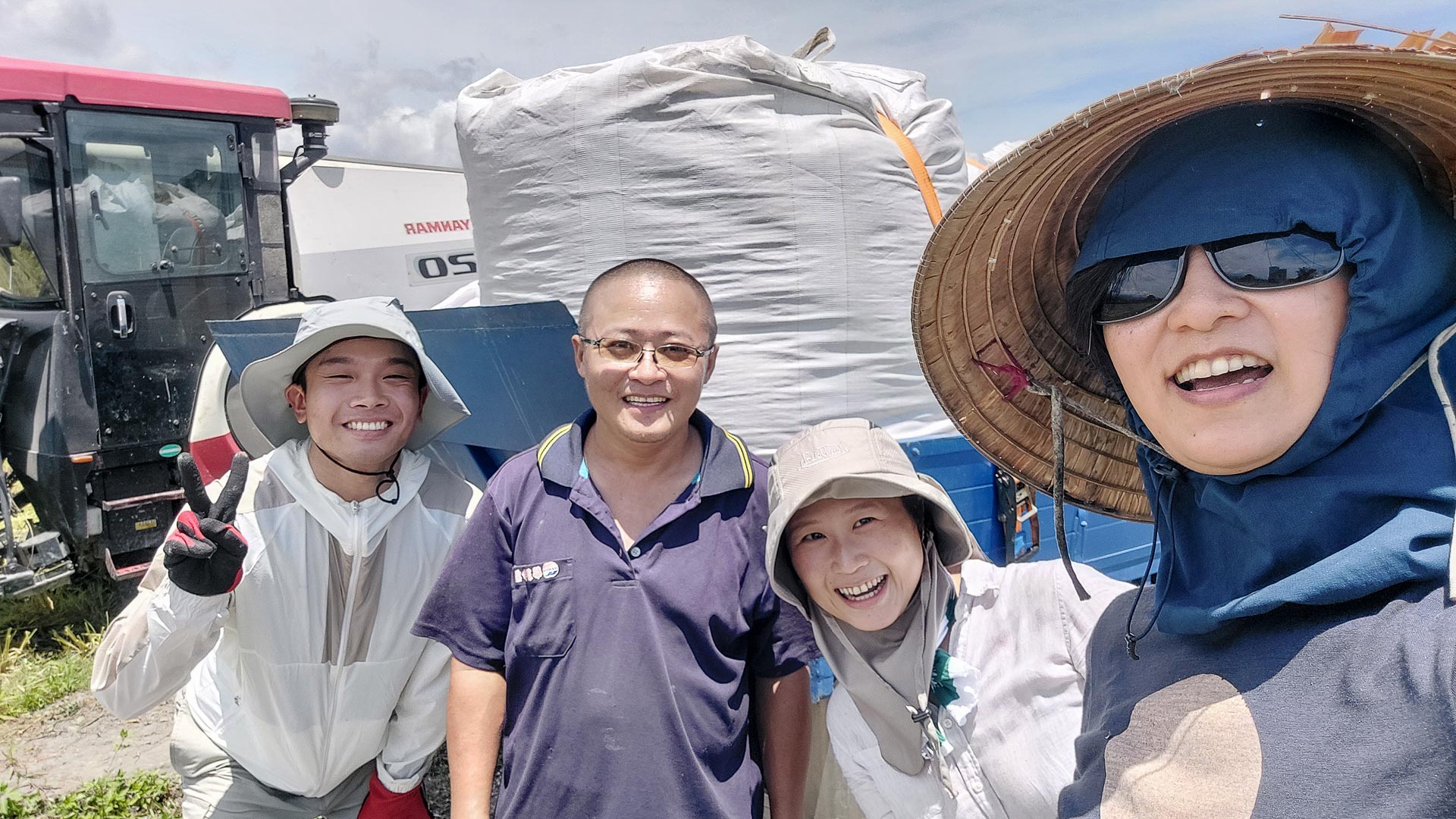
Two other villagers arrived around the same time. Yen-ling consulted them about some technicalities of green manure—an eco-friendly way to enrich the soil at the end of a harvest—including the best distribution methods and the ideal proportion of the manure’s ingredients. Information and questions flowed freely as they checked in on the status of their respective harvests. “Growing rice is not the hard part of managing a farm—it’s making sure we don’t have a surplus,” one of the other villagers said, wishing everyone a successful sales season as he opened his tractor door to drive away. A burst of knowing laughter and well wishes lingered in the air as everyone dispersed.
“Of course, the countryside is like anywhere else. You have people who are difficult to work with,” Yen-ling said over a lunch of noodles and vegetarian side dishes as she and their harvest contractor commiserated over an unpleasant interaction with another villager. “But that has less to do with our identity as women. By quietly farming, by showing up at each harvest cycle, we have become embedded in this community.”
Indeed, Yen-ling and Kai-lun (albeit to a slightly lesser degree, as this was only her second harvest) joyously exchanged pleasantries with folks at the plant as well as passersby who wished them a smooth harvest from their car windows. Those initial questions—Are you married? Where is your father or husband?—are no longer recurring features of their life, and much of the attention focused on them as a lesbian or women’s collective has faded. “It helps that we don’t get a lot of press anymore,” Yen-ling added. “Back in the day, some men were angry that women were speaking on their behalf.”
“Now, we’re all just neighbors exchanging tips and recipes and baked goods.”
* * *
When I first reached out to Land Dyke with a request to learn about it, Yen-ling emphasized that much has changed about the collective. Of course, gender and sexuality are still core features of Land Dyke’s name, logo and cooperative model. It still proposes an economic model and division of labor unencumbered by marriage and the gendered norms that come with it. However, the group no longer hosts educational events or leads campaigns addressing urban gender activists’ concerns. In some sense, Land Dyke’s current brand of activism is rooted in its care for the land, through eco-friendly farming techniques, and in the needs of other small farmers and community members around them. But the rainbow logo printed on all Land Dyke’s processed goods and rice bundles reminds people across Taiwan that there are indeed queer and femme people living on their own terms in the countryside.
Today, though, Yen-ling would likely reject the label of “activist.” As she reminisced about the collective’s past, I felt a twang of sadness—how devastating it must have been to watch the original members leave the collective and abandon this ambition, to go through a separation. I think about other gender activists I’ve met throughout my time in Taiwan who have chosen to “get off the train”—a phrase they use to indicate that they are putting down the banners and loudspeakers, often for self-care or self-preservation, even if they had not yet achieved their goals.
In 2024, Yen-ling’s priority seems to be a quiet life—documenting the fauna in the rice paddies, sampling the soil, understanding how to reduce the carbon footprint of harvest and learning how to be a better farmer with each harvest. Cycles of agricultural time guide her forward, even across other facets of her life. One of her more recent academic projects is focused on the history and migration of invasive golden apple snails, which leave a slimy trail on her hand as she picks them off of her rice crops each spring. (Unlike the use of camellia seeds as a pesticide to kill off the snails, hand-picking ensures that other animals living in the paddies remain unharmed.)
As I boarded an inter-county bus to return to Taipei, dazed and sticky from the sun, I pondered the significance of Land Dyke de-emphasizing (at least, to the outside world) gender and sexuality as core identitarian concerns but continuing as an agricultural collective. Some writing in the United States and other parts of the world celebrates the proliferation of young queer farmers, who think of their identity and farming as “forms of rebellion” working toward a sustainable world that lasts beyond climate change. Though no longer positioned as “escapist,” as much of the movement in the 1970s was labeled, there is a romanticization of these brave queer people, laboring and railing against capitalism and industrialism with their whole lifestyles.
In Yen-ling, I see someone who has been worn out by her earnest attempt to pursue a life entirely rooted in activism—a cautionary tale belied by the blue sky and golden field-filled future that initially struck me when I arrived in Yilan that morning. As she said to me earlier: farming, as with the oft-forgotten labor of building a family, is difficult work, but it often takes experiencing it to realize it.
Even so, rather than have Land Dyke’s story end as a failed experiment in building a multiple-person household, the venture—with the membership of Yen-ling, Kai-lun and three others who manage separate fruit orchards and vegetable patches—has persisted as a collective whose members support one another, even without being bound by notions of family, blood relations or male-centered inheritance and lineages. In Taiwan’s rapidly aging, small-scale agricultural sector, issues of family include not only how we relate to one another. It is a matter of economic survival: farm-based profits are becoming slimmer by the year and fewer members of younger generations remain on farms, leading many farmers to sell their land to developers and speculators. Land Dyke has quietly but dutifully passed on knowledge, shared resources between members and continued to figure out—through each harvest, each rotation of members—new ways to face such pressures.
At the end of her essay about Land Dyke, Chen describes the emotional difficulty of putting her departure from the family and collective in words. “When a romance ends, we call it a breakup. When marriage ends, divorce. But in this relationship, no words can wholly name the sadness as well as the freedom that overcame me when I left,” she writes.
After I have returned to Taipei, Yen-ling adds me to a shared Google Photos folder. The last photo in the album is taken at dusk; the sun is just beginning to set underneath the western mountains, casting a cool glow over the scattered blades of grass and dry scythed stalks peeking up from the flattened paddy. In the distance, Kai-lun tosses green manure over the land, preparing for the natural cycle of agricultural time to continue spinning onward.
Top photo: Yen-ling, left, and Kai-lun, right, pose in front of their rice paddies

